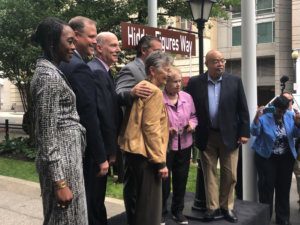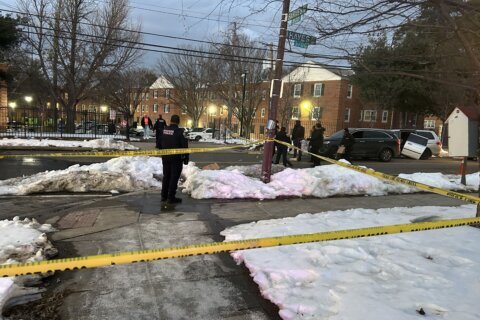A piece of a D.C. street has been renamed to honor three black women who were heroes of the space program.
The block in front of NASA headquarters, in Southwest D.C., was renamed Hidden Figures Way on Wednesday to honor Katherine Johnson, Dorothy Vaughan and Mary Jackson, three mathematicians who overcame discrimination and segregation to play key roles in the space program and have been immortalized in the book and movie of the same name.
Speakers at the ceremony Wednesday included Margot Lee Shetterly, the author of “Hidden Figures”; Sen. Ted Cruz, who introduced the legislation renaming the street; and D.C. Council Chairman Phil Mendelson, who was instrumental in its adoption.
NASA administrator Jim Bridenstine reminded the crowd that the women did their work at a time of “a contest of ideologies” with the Soviet Union. He called the women an “element that was not recognized. … Now, it is time to celebrate them in a major way.”

“Today is a celebration of women,” Cruz said. “Today is a celebration of African American pioneers. Today is celebration of American heroes. This is a wonderful day.”
He recalled watching the movie with his mother, wife and daughters, and talking with his daughters afterward.
“Why would people do that?” Cruz remembered one of his daughters saying of segregation afterward.
“For years and for decades and for centuries, when little girls and little boys come to see NASA, they’re going to look up and see that sign. And they’re going to ask ‘Hidden Figures? What does that mean?’ And that in turn is going to prompt a story.”
That story, he said, will “inspire generations after generations of kids, and in particular little girls, who may be told at school, ‘You can’t do something.’”
Shetterly, whose father worked as a research scientist at NASA and knew some of the women who were known as “computers,” said her work was not about the end of the story — it was about the beginning.
She added that she wanted to relate the history of “how [these] black women combated the quotidian humiliation of racism through perseverance and mathematical talent, and it’s about how women of all backgrounds proved that not only are women good at math; sometimes, they’re the best at math.”
Shetterly added, “May this street … serve to remind us, and to everyone who walks here and comes to this building, of the standard that was set by these women with their commitment to science and their embodiment of the values of equality, of justice and humanity.”
WTOP’s Melissa Howell contributed to this report.








